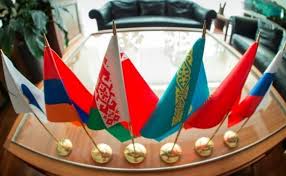Eurasian Economic Union Working on Tax Harmonization
 Progress has been made concerning the introduction of tax harmonization within the EAEU, the trade bloc featuring Russia, Armenia, Belarus, Kazakhstan, and Kyrgyzstan.
Progress has been made concerning the introduction of tax harmonization within the EAEU, the trade bloc featuring Russia, Armenia, Belarus, Kazakhstan, and Kyrgyzstan.
Discussions among the current EAEU members are of increasing significance as several Asian nations are negotiating Free Trade Agreements with the EAEU, including China, India, and Singapore. Vietnam already has an FTA with the EAEU.
The EAEU Commission has noted that during the round table “Topical Issues of Tax and Customs & Tariff Regulation”, the Executive Secretary of the Advisory Committee for Tax Policy and Administration at the Board of the Eurasian Economic Commission (EEC), Nurmatbek Mambetaliev, spoke about promising directions for harmonization of tax legislation of the Member States of the Eurasian Economic Union (EAEU) in mutual trade. The event was organized by the Centre for Tax Policy and Tax Administration of the Financial University at the Government of the Russian Federation, in cooperation with the EEC, the Federal Tax and Customs Services, and several consulting companies.
The EEC representative noted that within the overall convergence of legislation, at the first stage it is planned to harmonize excise duty rates on alcohol and tobacco products. Relevant draft agreements are being prepared. After approval at the level of Vice Prime Ministers of the countries of the Eurasian Economic Union, these international regulations will be sent to the Member States for signing.
In the long term, in connection with the establishment of the common market of hydrocarbons, it is planned to begin work on the harmonization of excise duty rates for this product family, too.
Development of strategic approaches to a taxation regime for e-commerce goods, that is agreed upon by all parties, is also a priority for the EEC. Currently, the Commission is developing a harmonized taxation mechanism for e-commerce goods. At the same time, it is important to establish information exchange between tax and customs authorities to track commodity flows (balance).
Federal Customs and Tax Services support the proposals of the EEC. Russian governmental agencies find it expedient to work on creating a common mechanism for the administration of customs and tax payments, taking into account the resolution of the issue of levying VAT on exports and imports of goods in the mutual trade of the EAEU Member States.
Representatives of the Financial University at the Government of the Russian Federation also favored the elaboration of common methodological approaches to harmonization of indirect taxation in the EAEU.
Harmonization among EAEU members will make trade facilitation much easier and will pave the way for easier implementation for other nations to enter into productive meaningful free trade agreements.
About Us
Silk Road Briefing is published by Asia Briefing, a subsidiary of Dezan Shira & Associates. We produce material for foreign investors throughout Eurasia, including ASEAN, China, India, Indonesia, Russia & Vietnam. For editorial matters please contact us here and for a complimentary subscription to our products, please click here.
Dezan Shira & Associates provide business intelligence, due diligence, legal, tax and advisory services throughout the Asian and Eurasian region. We maintain offices throughout China, South-East Asia, India and Russia. For assistance with OBOR issues or investments into any of the featured countries, please contact us at silkroad@dezshira.com or visit us at www.dezshira.com
Related Reading:
Silk Road and OBOR Business Intelligence
Dezan Shira & Associates´ Silk Road and OBOR investment brochure offers an introduction to the region and an overview of the services provided by the firm. It is Dezan Shira´s mission to guide investors through the Silk Road´s complex regulatory environment and assist with all aspects of establishing, maintaining and growing business operations in the region.






